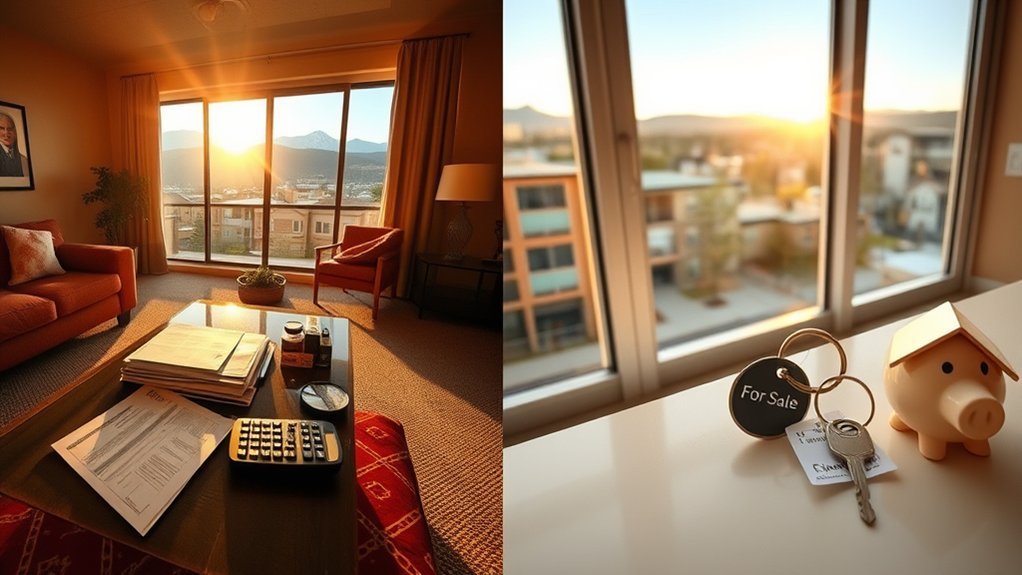You’ll need roughly $4,900–$8,800 per month depending on household size, with average rents around $1,677–$1,732 and lower-cost neighborhoods near $1,428. Expect utilities about $188–$200 and groceries typically $710 for singles up to $1,600+ for families. Buying is pricier up front with median homes around $535k–$597k, while price-to-rent near 26.5 often favors renting. Keep going and you’ll find detailed breakdowns by family type, taxes, and wages.
Monthly Budget Breakdown: Rent, Utilities & Groceries

When you build a monthly budget for Reno, focus first on housing, utilities, and groceries — the three biggest, predictable costs you’ll face.
For a practical monthly budget breakdown, use the average rent in Reno of about $1,677–$1,732 as your baseline for monthly rent; lower-cost neighborhoods like East Reno Heights or Brookside Lakes average near $1,428–$1,432.
Utilities in Reno commonly add $188–$200 for energy plus phone/internet, with an average electric bill around $199.85; total utilities estimates range higher for different household types.
Groceries in Reno run roughly 2.6% above the U.S. average—expect items like milk $4.49–$4.66/gal and eggs $3.43–$4.33/dozen, translating to roughly $710 monthly for many renters.
Given housing costs and a price-to-rent ratio near 26.5 with median home price ~$535,000–$596,654, the rental market often yields a more affordable path when modeling your cost of living in Reno. Additionally, understanding local market conditions can help you navigate housing costs effectively.
Housing Market: Buying vs. Renting in Reno

Because Reno’s housing costs have climbed faster than many places, you’ll want to weigh buying against renting with close attention to numbers rather than intuition.
Reno’s median home price (~$535,000) sits about 24% above the U.S. median and has risen ~5.9% year‑over‑year, so calculate expected monthly mortgage, down payment and maintenance before committing.
The metro price-to-rent ratio (~26.5) currently favors renting for many households; average rent runs ~$1,677–$1,732/month with clear neighborhood rent variation (East Reno Heights ~$1,428 vs Double Diamond ~$2,092).
Factor in long-term housing market trends, your savings for down payment, and whether projected equity will outpace rent inflation.
- Fear of missing out — high prices push urgency.
- Relief of flexibility — renting limits commitment.
- Anxiety over cash — down payment and housing wage gaps matter.
- Confidence in investment — buying may pay off if trends continue.
Use affordability calculations, break‑even timelines, and local data to decide buying vs renting. Additionally, consider how repair costs for school computers can impact overall budgeting decisions, especially in households with students.
Typical Household Expenses by Family Type

After you compare buying versus renting, your next practical step is to forecast monthly expenses by household type so you can budget realistically. Use these figures to map the Reno cost of living to your family budget Reno. A typical renter household spends about $4,928/month, with housing costs (average rent) near $2,224 and groceries in Reno about $710. Homeowner expenses average roughly $8,846/month, driven by mortgage/property costs of $2,697 and utilities and healthcare around $760.
If you’re a married couple with young kids (under 6), plan for about $7,312/month: $2,445 housing, $1,380 groceries in Reno, and $967 transportation costs. For families with kids 6–17, expect higher monthly expenses — roughly $8,214 — with housing $2,706, groceries $1,612, and transportation $1,113. Compared with national averages, Reno’s housing and transportation costs trend higher while utilities and healthcare can be lower, so align your projections with median household income and priorities. Additionally, understanding ongoing expenses will help ensure that your family budget accommodates all necessary costs.
Income, Wages & Employment — What You Need to Afford Reno

Figure your income needs against Reno’s job market and wage profile to know whether the city fits your budget: average annual pay is about $74,000 (Payscale), with common local salaries ranging from roughly $53,480 for health technologists to about $97,160 for registered nurses and $90,730 for technical writers.
Compare your income to Reno’s job market: average pay ~$74K, with common roles from ~$53K to ~$97K.
You’ll compare that average salary to local costs: median price signals for housing cost and rent push a two-bedroom housing wage to about $30.42/hour ($63,280/year). Minimum wage is $12/hour, so many entry roles won’t cover that housing benchmark.
Think about where you’d work — major employers include the Washoe County School District, Renown Regional Medical Center, and large resorts — which shapes job availability and income potential.
To live comfortably as a single adult you’d need roughly $59,136/year; family living wage estimates are much higher. Additionally, replacement costs for essentials like retainers can impact your overall budget.
- Worry if your income is near minimum wage.
- Reassess if rent exceeds 30% of income.
- Aim for roles near or above the average salary.
- Use employer stability to forecast income security.
Taxes, Utilities and Other Local Costs

While Nevada won’t take a bite of your paycheck, Reno’s other local costs will: combined sales tax sits around 8.24–8.265%, so everyday purchases add up and affect Reno cost of living.
You’ll benefit from no state income tax, but plan for higher consumption costs and housing-driven expenses.
Utilities average is important: expect a monthly electric bill near $188–$200 (estimates vary $179–$199.85) and phone service roughly $62–$189 depending on plan.
Water bill averages about $70/month and can approach $100 in summer with irrigation; energy costs spike seasonally.
Property taxes are calculated on assessed value (about 35% of taxable value in Washoe County) with effective overlapping rates near 3.7% of assessed value; exemptions can reduce bills.
Given current home prices, the housing wage to afford a two‑bedroom without exceeding 30% of income is about $30.42/hour (~$63,280/year).
Factor these items into monthly budgets to get a realistic picture of living in Reno. Additionally, be mindful of operational expenses that can significantly impact overall financial planning.
Frequently Asked Questions
How Much Do You Need to Live Comfortably in Reno, Nevada?
You’ll need about $4,928/month to live comfortably in Reno. Account for housing choices, transportation costs, groceries budgeting, healthcare expenses, utility breakdowns, entertainment options, childcare needs or senior living, plus monthly savings and emergency funds.
What Is the Cost of Living in Reno, NV?
Reno’s cost of living is slightly above average: you’ll face rising housing trends, notable transport expenses, moderate utility bills, food prices and groceries comparison favoring modest savings, lower healthcare costs, childcare options, entertainment fees, insurance premiums and local taxes.
What Is Middle Class Income in Reno?
Think of middle class as a spectrum: you’re around Reno’s median income (~$74,000), where household earnings place you in mid wage brackets and salary tiers, affecting purchasing power, disposable income, tax impacts, living standards, economic class.
What Is the Cost of Living in Reno Nevada 2025?
Reno’s 2025 cost of living is about 3.8% above U.S.; you’ll budget for rental neighborhoods, utility expenses, transportation costs, groceries comparison, healthcare prices, childcare rates, entertainment budget, seasonal expenses, senior living, and pet ownership.
Conclusion
You’ll get by in Reno if you plan carefully: rent and utilities take the biggest bite, groceries and transportation add predictable costs, and taxes nudge your take-home pay. Compare buying vs. renting with local prices and your job stability, and map expenses for your household type. Use income and wage data to set realistic budgets, and build a buffer for surprises — this city’s cost can feel huge, but clear numbers keep you ready.


